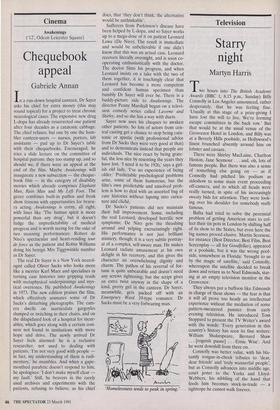Cinema
Awakenings ('1 2', Odeon Leicester Square)
Chequebook appeal
Gabriele Annan
n a run-down hospital canteen, Dr Sayer asks his chief for extra money (this may sound topical) for a project to treat chronic neurological cases. The expensive new drug L-dopa has already resurrected one patient after four decades as a catatonic cabbage. The chief refuses; but one by one the hum- bler canteen-users — nurses, porters, lab assistants — pad up to Dr Sayer's table with their chequebooks. Encouraged, he tries a slide lecture on the committee of hospital patrons: they too stump up, and so should we, if there were an appeal at the end of the film. Maybe Awakenings will inaugurate a new subsection — the cheque- book film — in the category of disability movies which already comprises Elephant Man, Rain Man and My Left Foot. The genre combines built-in pathos and freak show frissons with opportunities for bravu- ra acting. Awakenings is corny, all right, with lines like 'The human spirit is more powerful than any drug', but it doesn't fudge the unpredictability of medical progress and is worth seeing for the sake of two stunning performances: Robert de Niro's spectacular and heart-rending tour de force as the patient and Robin Williams doing his benign Mrs Tiggywinkle number as Dr Sayer. The real Dr Sayer is a New York neurol- ogist called Oliver Sacks who looks more like a merrier Karl Marx and specialises in turning case histories into gripping reads with metaphysical underpinnings and mys- tical overtones. He published Awakenings in 1973. The new edition praises the film, which effectively animates some of Dr Sacks's disturbing photographs. The cam- era dwells on inarticulate gargoyles slumped or twitching in their chairs, and on the dilapidated look of a hospital for incur- ables, which goes along with a certain cosi- ness not found in institutions with more hope and drive. The newly arrived Dr Sayer feels alarmed: he is a reclusive researcher, not used to dealing with patients. 'I'm not very good with people — in fact, my understanding of them is rudi- mentary,' he mumbles. And when a gape- mouthed paralytic doesn't respond to him, he apologises: 'I don't make myself clear — my fault.' Still, he beavers in the rarely used archives and experiments with the patients, refusing to believe, as his chief
does, that 'they don't think; the alternative would be unthinkable'.
Sufferers from Parkinson's disease have been helped by L-dopa, and so Sayer works up to a mega-dose of it on patient Leonard Lowe (De Niro). The result is immediate and would be unbelievable if one didn't know that this was an actual case. Leonard recovers literally overnight, and is soon co- operating enthusiastically with the doctor. The doctor films his progress, and when Leonard insists on a take with the two of them together, it is touchingly clear that Leonard has become a more competent and confident human specimen than bumbly Dr Sayer will ever be. There is a buddy-picture side to Awakenings. The director Penny Marshall began on a televi- sion comedy series called Laverne and Shirley, and so she has a way with duets.
Sayer now uses his cheques to awaken other patients. So lots of actors from cen- tral casting get a chance to stop being cata- tonic or spastic (with professional advice from Dr Sacks they were very good at that) and to demonstrate instead that people are individuals. The nice react by being grate- ful, the less nice by resenting the years they have lost. 'I need it to be 1926,' says a girl- ish old lady, 'I've no experience of being older.' Predictable psychological problems arise, some of them humorous; but the film's own predictable and unsolved prob- lem is how to deal with an assorted bag of case histories without lapsing into carica- ture and cliché.
Dr Sacks's patients did not maintain their full improvement. Some, including the real Leonard, developed horrific new symptoms; De Niro gets the thrashing around and yelping excruciatingly right. His performance is not just brilliant mimicry, though; it is a very subtle portray- al of a complex, self-aware man. He makes Leonard radiate amusement at his own delight in his recovery, and this gives the character an overwhelming dignity and charm. The pathos of his reversal of for- tune is quite unbearable and doesn't need any screws tightening; but the script gives an extra twist anyway in the shape of a kind, pretty girl in the canteen. Dr Sayer, meanwhile, gets packed off with an Emergency Ward /0-type romance. Dr Sacks must be a very forbearing man.
'Homelessness tends to peak in spring.'


























































 Previous page
Previous page